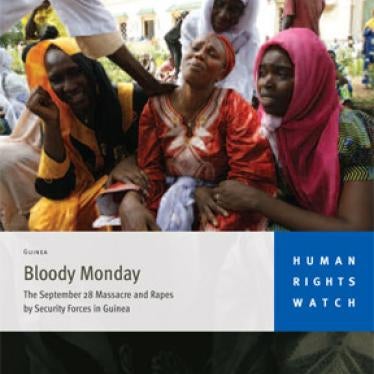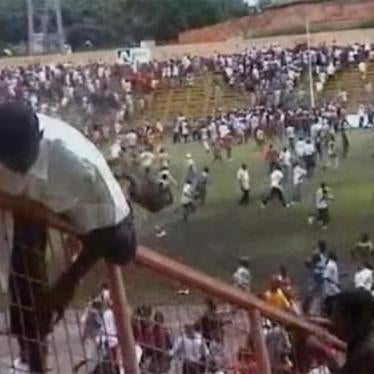(Johannesburg) – Hundreds of victims of the 2009 massacre, rapes, and other abuses by security forces in Guinea have yet to see justice done, Human Rights Watch said today on the eve of the third anniversary of the attacks. The Guinean government should increase support for the domestic investigation of the crimes so that those responsible can be held to account without further delay.
On September 28, 2009, several hundred members of Guinea’s security forces burst into a stadium in Guinea’s capital, Conakry, and opened fire on tens of thousands of opposition supporters peacefully gathered there. By late afternoon, at least 150 Guineans lay dead or dying, and dozens of women had suffered brutal sexual violence, including individual and gang rape.
“The victims and loved ones of those who perished have yet to see the men who carried out the horrific crimes that took place on September 28, 2009, brought to book,” said Elise Keppler, senior international justice counsel with Human Rights Watch. “Moreover, the persistent failure of the government to hold human rights violators to account over decades of repressive rule in Guinea has fueled further abuses.”
In February 2010, a domestic panel of judges was appointed to investigate the September 28 crimes. The panel has made some important strides to advance the investigation, including interviewing more than 200 victims, Human Rights Watch said. Charges also have been filed against at least seven people in connection with the crimes. They include Moussa Tiégboro Camara, Guinea’s current minister in charge of fighting drug trafficking and organized crimes, and, more recently, Colonel Abdoulaye Cherif Diaby, who was Guinea’s health minister on September 28, 2009.
However, well over two years later, more than 100 victims await the opportunity to provide statements to the investigating judges, and possible mass graves have yet to be investigated. The investigating judges also have yet to interview at least two key people implicated in the crimes – Captain Moussa Dadis Camara, who was president at the time, and Captain Claude “Coplan” Pivi, who was the minister of presidential security at the time and continues to hold that post. Nor has the panel interviewed other witnesses from Guinea’s security services.
The investigating judges have not had adequate equipment and supplies and have had only limited security protection. In addition, key suspects such as Moussa Tiégboro Camara have not been placed on leave from their government positions pending investigation – even though in Tiégboro Camara’s case he is in a position to intervene in criminal investigations.
A Human Rights Watch investigation in 2009 suggested that the killings, rapes, and other abuses committed by the security forces on and after September 28 rise to the level of crimes against humanity, given their widespread and systematic nature. A commission of inquiry established by the United Nations Secretary-General also found that it was reasonable to conclude that crimes against humanity were committed.
In October 2009, the International Criminal Court (ICC) Office of the Prosecutor placed the situation in Guinea – which joined the ICC in 2003 – under preliminary examination. Whether the ICC may open an investigation in Guinea is an open question: under the ICC’s complementarity principle, the ICC only acts if national authorities are unable or unwilling to prosecute.
But even if the ICC were to open an investigation, its scope to ensure justice would be limited as it focuses only on genocide, war crimes, and crimes against humanity and suspects at the greatest levels of responsibility, and the court is based thousands of miles from Guinea.
Human Rights Watch conducted fact-finding in Guinea in June 2012 to assess the progress of the September 28, 2009, investigation with a view to promoting fair, effective domestic investigation and prosecution of the crimes. A report on this research is forthcoming.
“Guinea is sending a terrible signal to victims by allowing key suspects to remain in government posts where they can influence the investigation,” Keppler said. “While the investigating judges have made some progress in the investigation, they need more support from the Guinean government if they’re going to help break the cycle of abuse and build respect for rule of law in Guinea.”






